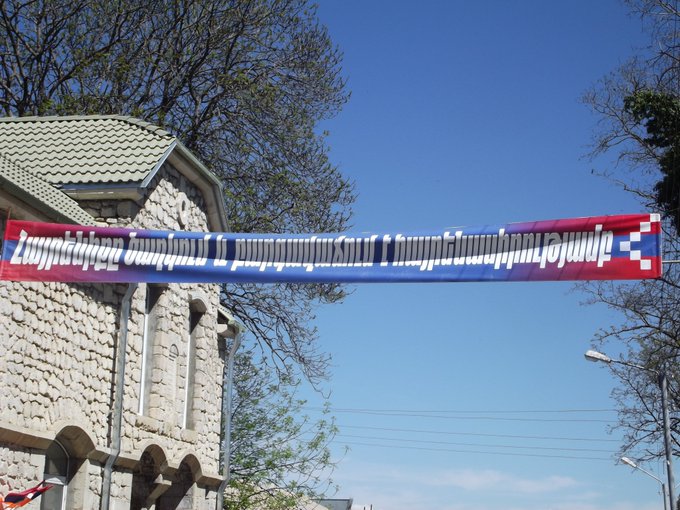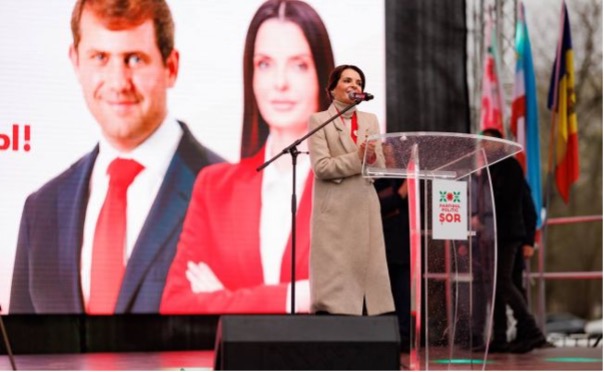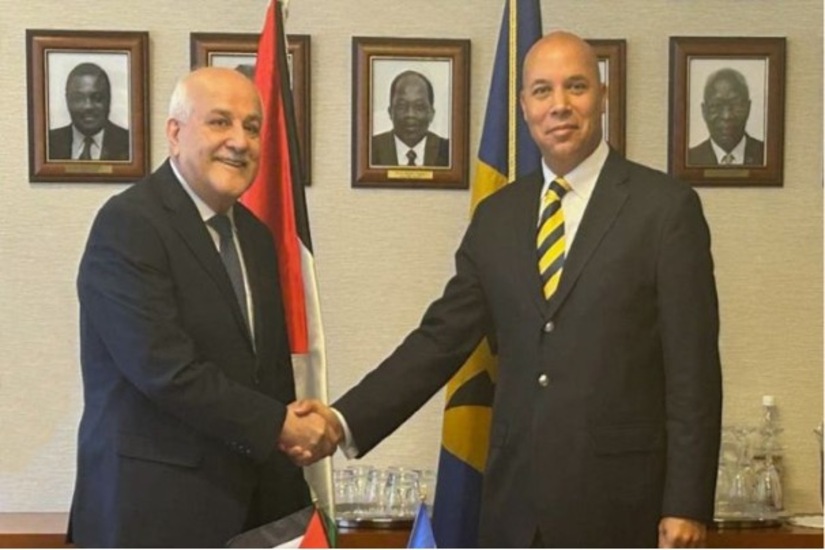Artsakh’s Defiance in the Face of Strategic Uncertainty
Since November 2020, the events in and around Armenia and Artsakh (Nagorno-Karabakh) are spearheading with such speed that neither of the parties can pause, comprehend the complexity of situation, estimate scenarios and come up with some mid-term policy options. While Azerbaijan has posed deliberately excessive and unacceptable provisions in front of Armenia effectively halting the negotiations, then Artsakh, meanwhile, has been kept in the dark and uncertainty. What is the situation in Artsakh? How the government and people of Artsakh see the country’s future in the face of expanding Azerbaijani belligerence, maximalism, and antagonistic posture.
The 2020 war was a fatal blow to Artsakh and its 30-year-old de facto statehood. It was a test of epic of proportions which set the parameters of regional developments, in society and politics at large, and hence for many years and decades to come. This war has created an unprecedented situation for Artsakh’s society and government. The problems Artsakh has been facing since 2020 have at least three distinct layers: perennial matters of security; deepening sense of societal apathy and alienation; damaged communication with Yerevan.
Since 2020, the notion of security in Artsakh has transformed dramatically. Before 2020, Artsakh’s government controlled around 12,000 km2 territory, which provided strategic depth, and had two roads connecting to Armenia. It had formidable armed forces with combat experience and defensive weapons. It was able to exert control over key strategic heights and lines, including minefields. Since October-November 2020, the situation has changed dramatically as Stepanakert now controls less than 3,000 km2 of the former NKAO territory of 4,400 km2. Out of the 9,000 km2 territory lost to Azerbaijan, the latter was able to take through military means only 2,700 km2, the rest of the territory Armenia’s leader Pashinyan abruptly agreed to give back to Azerbaijan under the pressure of the situation without any consultation with the society and political-military elite.
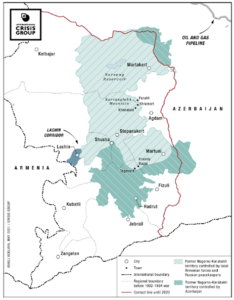
Image: The shrinking territory of Artsakh (Source: ICG 2022)
By agreeing to let Karvachar (Kelbajar) and Berdzor (Lachin) go to Azerbaijan – without a single bullet shot and without demanding demilitarization – Pashinyan gravely undermined not only Artsakh’s security. His strategic miscalculation and overconfidence in the good-faith of the adversary have fundamentally compromised the foundations of Armenia’s security leaving the strategically important territory between Artsakh and eastern regions of Armenia to become a launchpad for Azerbaijan’s armed forces. Azerbaijan has blocked the Vardenis-Stepanakert road in the starting days of the 2020 war, while the Goris-Shoushi-Stepanakert road – the so-called Life Road – was cut off during the recent months. Armenians were given a different road that Azerbaijan has hastily built to make Armenians reach Stepanakert bypassing Shoushi. Artsakh’s armed forces have shrunk dramatically as Armenian conscripts can no longer serve in Artsakh.
Bewildered and weakened, Artsakh finds difficult to shape the parameters of its new security policy. Artsakh’s government and parliament are effectively alienated from the negotiations. Aliyev’s false and self-deceptive belief that the “Karabakh question” is over and his reluctance to relaunch negotiations as well as Russia’s support of Azerbaijan’s position has exacerbated the situation for the Artsakh government. It is in frantic search to find a new strategy of development which would inspire hope and vision of a future where Artsakh is secure and continuously populated by Armenians.
The effectiveness of Russian peacekeepers in Artsakh’s remaining territory, although serving as a formal deterrence, is also put under a giant magnifier. Residents of Artsakh are becoming more concerned with the way the Russian peacekeepers engage with the Azerbaijani armed forces when ceasefire violations take place. In the face of permissive stance of Russian peacekeepers on many instances of Azerbaijan’s violations of ceasefire, Armenians in Artsakh are becoming more cognizant of the fact that Russia has a limited desire to back up the vague mandate that was hastily defined in the early hours of November 10, 2020. However, despite grievances and mounting criticism, Russian peacekeepers still remain the only security guarantors of the Artsakh’s population.
Artsakh has received financial and technical support from Armenia to cope with the disastrous implications of the war and to make sure that people’s basic social needs are met. In the face of 40,000 IDPs, the Artsakh’s government has to build new houses and provide accommodations for its citizens. People of Artsakh still find it difficult to realize what happened to them and how their dreams and sense of security shattered within six weeks. Emotionally and psychologically, they are in volatile position deprived of their basic sense of security. They are in deep search of a new survival strategy.
Aliyev’s bellicose rhetoric makes the situation grave. Despite Stepanakert’s recent messages that it is open to talk to Baku directly, Azerbaijan has been neglecting such voices and dehumanizing Artsakh’s democratically elected leaders. Grievous consequences of war have undermined any previous notions of relative security and fragile peace while a new notion of peace and security is yet to emerge. A deep sense of apathy and alienation has become a dominant mood among Armenians in Artsakh. No Armenian high-ranking official has visited Artsakh for a very long time now. Pashinyan, who was praised in Artsakh before the war, is widely seen as the main culprit for the calamity that befell on Artsakh.
Ruben Vardanyan, a wealthy Russian-Armenian businessmen turned philanthropist, has recently launched an initiative “Artsakh Security and Development Front” and moved to Artsakh vowing to stay there until Artsakh becomes more secure. His bold move was praised by many as he renounced his Russian citizenship and urged many of his compatriots to join him to make “one of the pillars of Armenian identity more secure and prosperous again.” Soon, the Artsakh government stated that Rouben Vardanyan would be appointed as the new State Minister with expanded areas of responsibilities. Some interpreted this move as strategic, as he himself had set eyes on Armenia’s politics long time ago. It would be safe to assume that serving a governmental position in Stepanakert will prepare him to enter Armenian politics with tangible political experience. Others saw his relocation decision as a desperate consolidation call to Diaspora Armenians to leave behind narrowly defined interests and to focus more on Artsakh.
The peace agenda that Pashinyan has been pushing since November 2020 has found little sympathizers in Artsakh. People claim that the person who made the war possible, cannot make peace. Artsakh’s population believes the day Azerbaijan receives a green light to enter Stepanakert the doors to ethnic cleansing, displacement, depopulation, cultural destruction, social and demographic engineering will be set wide open. Armenians see and feel a deep-seated sense of animosity, revanchism and hatred against them flooding from Baku.
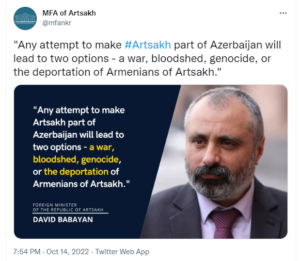
Image: A sense of no hope seen by policy-makers in Artsakh (Source: Twitter)
The people of Artsakh have seen what happened to Armenia while Pashinyan’s government was advancing the idea of peace. Armenia became more fragile in face of the Turkish-Azerbaijani aggression. Artsakh, meanwhile, has learnt its share of the lesson as its population is reluctant to repeat the mistakes of 688,000 citizens of Armenia who re-elected Pashinyan in office in June 2021 believing that his promised peace is imminent. People in Artsakh saw that since May 2021, in parallel to peace negotiations, Armenia has lost around 120 km2 of its sovereign territories, as a result of Azerbaijan’s military occupation. The most recent overt act of aggression of Azerbaijan against Armenia in September 2022 killed 210 Armenians leaving behind IDPs, destruction, abandoned houses and schools.
Peace seems more distant now than ever before. Seeking peace in intractable environment with predictable destructions has become an anathema. With fractured military balance and Armenia’s government voicing that it is not able to procure the weapons it paid for, people of Artsakh realize the limited choices they have. The variables have become too many to monitor. Strategic calculations and constant adjustment of ends and means are becoming more difficult in the face of rapidly changing situation. Artsakh’s authorities express hope that the OSCE Minsk format can be reinvigorated despite Azerbaijan’s and Russia’s claims that it has become defunct.
Most important of all, Artsakh’s government is against Armenia’s government plans to acknowledge Azerbaijan’s territorial integrity which, according to their interpretations, implies Artsakh’s de facto submission to Azerbaijan. Artsakh’s leader, Arayik Harutyunyan, once Pashinyan’s ardent supporter and admirer, who used to publicly cite Pashinyan’s statements and expressions, is now having hard time understanding the status of negotiations. Stepanakert has sent envoys to Yerevan in order to make sense of the current state of negotiations and future of Artsakh but to no avail. They have returned to Stepanakert in despair because officials in Yerevan fail to assure that their fate is not sealed. Although Yerevan wants to leave the “Karabakh status question” open and stresses the human rights dimension of the conflict, it falls in deaf ears given the autocratic nature of Aliyev’s regime. In a comment addressed to Armenia’s leaders, Artsakh’s Foreign Minister remarked expressed hope that that “as long as there is no document signed there is still a room for negotiations and hope that Artsakh won’t be left alone.” He went on to claim “I refuse to believe that Armenia will renounce from Artsakh. It will be the last point of Armenia’s history.”
A series of strategic failures and miscalculations opened the gates for Azerbaijani invasion and occupation of Artsakh’s and Armenia’s territories. Emboldened by the limited international reaction and taking advantage of Armenia’s inept foreign and security policy, Azerbaijan keeps aggressively advancing its strategic agenda with renewed consistency. Soldiers of Azerbaijan’s armed forces easily and freely share videos of unspeakable acts of cruelty and mutilations they perform on Armenian soldiers. Artsakh’s Armenians see this and understand that even if “peace” is imposed as a result of a “final deal” it is going to be nothing but temporary. The war may be over but the conflict persists because the root causes of the conflict remain unaddressed. There are too many enduring and significant factors at play ignoring of which will create wishful perceptions for Azerbaijan. Even if Armenia decides to strike a deal with Azerbaijan and declare peace, post-conflict phase will remain a distant objective for the war-torn Artsakh.
Author: Vahram Ter-Matevosyan


